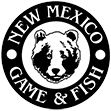New Mexico Department of Game and Fish
Public contact, Information Center: (888) 248-6866
Media contact, Tristanna Bickford: (505) 476-8027
tristanna.bickford@state.nm.us
FOR IMMEDIATE RELEASE, JULY 23, 2018:
Feeding bears can create unsafe conditions for people and the bear
SANTA FE – Human nature can lead us to believe that when we feed wild animals we are helping them. In reality we are causing them more harm than good. In the natural world, bears are very good at finding food sources on their own that help them maintain a balanced diet, without becoming habituated to people and residential environments.
In light of recent activities, the New Mexico Department of Game and Fish reminds people that it is never acceptable to feed bears or other wildlife. Bears that are intentionally or inadvertently fed items that are not natural to their diet, such as cracked corn or pet food, can quickly become habituated to receiving food and may become too comfortable with people and residential areas. This can cause bears to display nontypical behavior.
“Bears that become acclimated to receiving food from humans can become dangerous and aggressive toward people,” reminds department director Alexandra Sandoval. “These situations cause the department to make tough decisions to keep people safe. Remember, a fed bear is a dead bear.”
Bears who are accustomed to receiving food regularly from humans and do not get that food as expected, may go looking for different sources. Everyone is reminded to secure all pet food, bird feeders, livestock feed, fruit and garbage so bears do not become attracted to, and dependent on, human provided food sources.
If you have information about someone who is feeding bears, or other wildlife, call Operation Game Thief, (800) 432-4263. Callers can remain anonymous.
People are encouraged to call the department and report a bear that exhibits aggressive or unusual behavior. Bears that appear to be moving through the country should be left alone and there is no need to report them.
If you live or camp in bear country:
- Keep garbage in airtight containers inside your garage or storage area. Place garbage outside in the morning just before pickup, not the night before. Occasionally clean cans with ammonia or bleach.
- Remove bird feeders. Bears see them as sweet treats, and often they will look for other food sources nearby.
- Never put meat or sweet-smelling food scraps such as melon in your compost pile.
- Don’t leave pet food or food dishes outdoors at night.
- Clean and store outdoor grills after use. Bears can smell sweet barbecue sauce and grease for miles.
- Never intentionally feed bears to attract them for viewing.
- Keep your camp clean, and store food and garbage properly at all times. Use bear-proof containers when available. If not, suspend food, toiletries, coolers and garbage from a tree at least 10 feet off the ground and 4 feet out from the tree trunk.
- Keep your tent and sleeping bag free of all food smells. Store the clothes you wore while cooking or eating with your food.
- Sleep a good distance from your cooking area or food storage site.
Here are some ways to protect yourself if you encounter a bear:
- Stop, and back away slowly while facing the bear. Avoid direct eye contact, as the bear may consider that a threat. Do not run. Make yourself appear large by holding out your jacket. If you have small children, pick them up so they don’t run.
- Give the bear plenty of room to escape, so it doesn’t feel threatened or trapped. If a black bear attacks you, fight back using anything at your disposal, such as rocks, sticks, binoculars or even your bare hands. Aim for the bear’s nose and eyes.
- If the bear has not seen you, stay calm and slowly move away, making noise so the bear knows you are there. Never get between a mother bear and her cubs.
###
